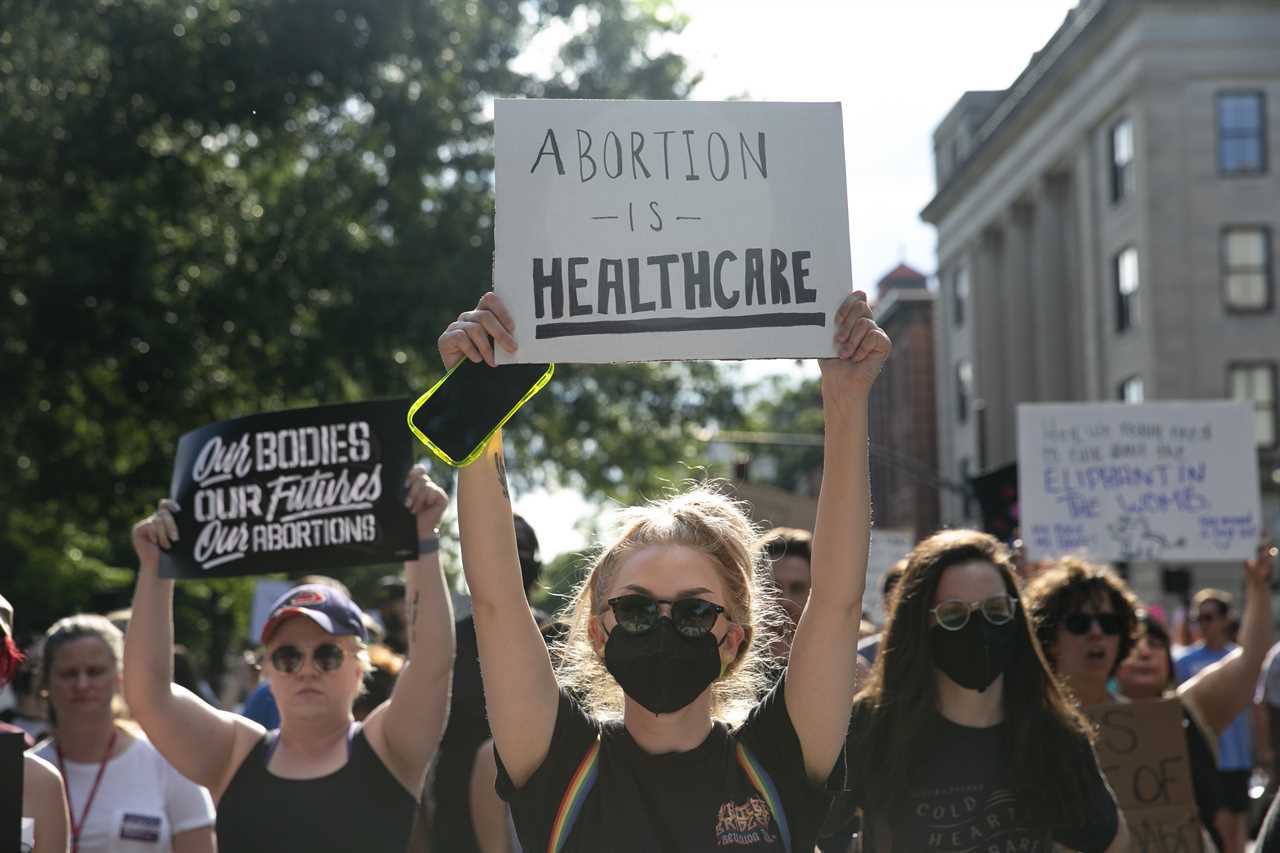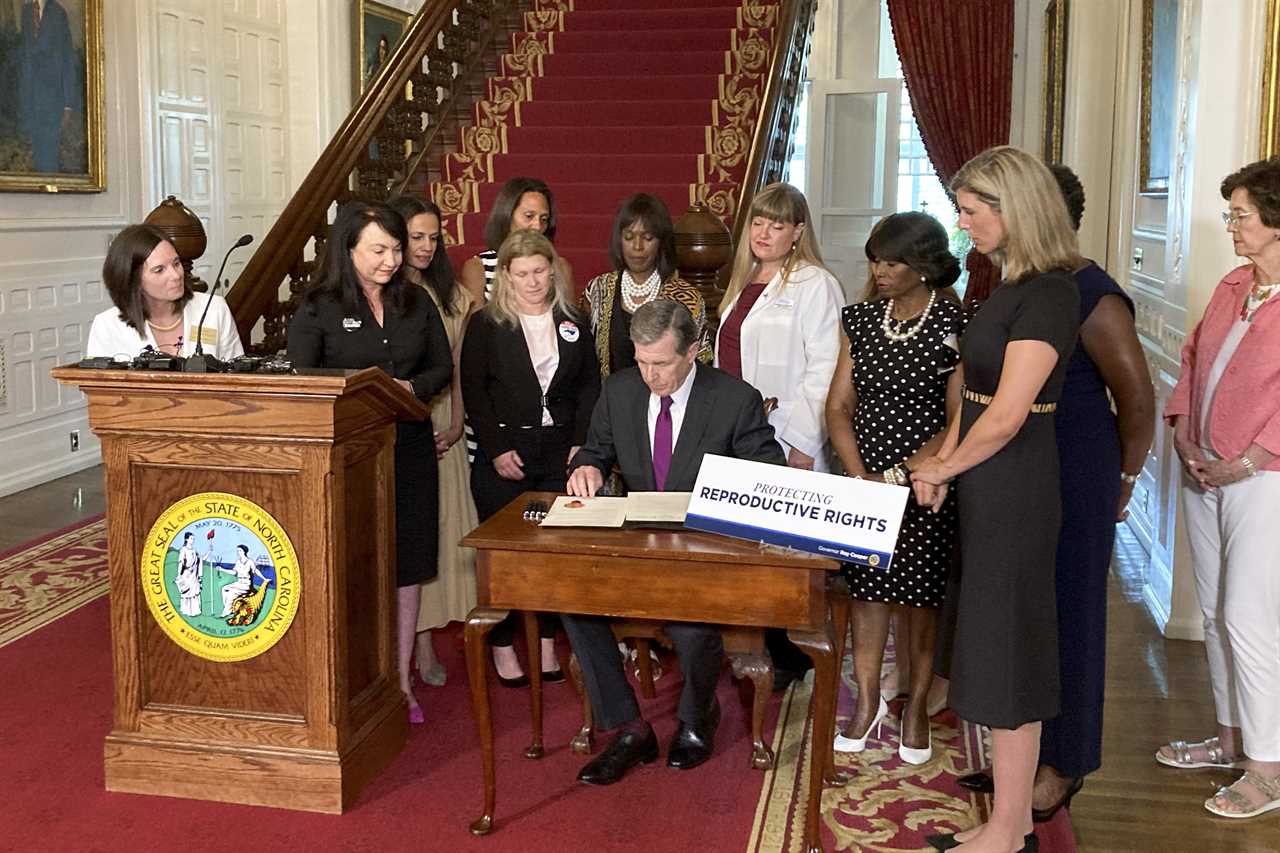
WAKE FOREST, N.C. — North Carolina is one of the few states in the Southeast that still offers some access to abortion. Hundreds of women from surrounding states have poured into its clinics since the Supreme Court overturned Roe v. Wade in June.
But the outcome of a handful of state legislative races this fall could restrict abortion access further or halt it altogether, there as well as in several other purple states. These far-down-the-ballot contests usually don’t register on the national radar, compared to the battle for control of Congress — but they could have a profound effect on the post-Roe abortion landscape.
Democrats on the ground are pouring organizing power into these races and leaning into abortion in conversations with voters, believing it could shift the political environment in their direction. But Democrats often fall behind Republicans in spending on state legislative races, and Jessica Post, president of the Democratic Legislative Campaign Committee, said the disparity has become alarming. The Republican State Leadership Committee outraised the DLCC by nearly $4 million during the last fundraising quarter.
“If we continue to neglect this level of the ballot, there will be devastating consequences,” Post said. “If you want to protect abortion rights, the single best place to devote your time, energy and resources is on state legislative races.”
In North Carolina, Democratic Gov. Roy Cooper and his veto stand in the way of new abortion restrictions in the state: Republicans are just two state Senate seats and three state House seats away from achieving veto-proof majorities there, a high-water mark for legislative power that Democrats only broke in 2018.
In Wisconsin, Republicans are one state Senate seat and five state House seats shy of veto-proof majorities of their own, and they’re running hard to unseat Democratic Gov. Tony Evers, too. In Virginia, Republicans need to flip only two state Senate seats in next year’s legislative elections to pave the way for a 15-week abortion ban supported by GOP Gov. Glenn Youngkin.
The potential repercussions offer Democratic candidates an opportunity to tie their contests to the national backlash against abortion restricts that have boosted the party over the summer, from a special election in upstate New York to a resounding ballot initiative defeat in Kansas. But Democrats also recognize it’s been difficult to get voters to tune into these smaller races in the past.

“Our challenge will be to convince — or not to convince because it’s true — will be to tell people that any one of these individual legislature races is just like a constitutional amendment in Kansas,” Cooper said in an interview at the governor’s mansion, citing the failed ballot initiative in Kansas to eliminate abortion access in the state earlier this month. Abortion rights supporters won by a double-digit margin, a heartening sign for state Democrats looking to make it a central issue during a tough midterm cycle.
“The vote is so close that any one of these districts across our state could make the difference in whether women’s reproductive health care is protected or not,” Cooper continued. “It’s that stark.”
That contrast is what had Mary Wills Bode, a 34-year-old first-time state legislative candidate, knocking on door after door here on a sweltering morning to explain “just how high the stakes are” in state legislative races like hers, a mantra she repeated to several voters. Bode is running in a newly drawn state Senate seat that folds in the north Raleigh suburbs and parts of a rural county, a district President Joe Biden won by a point in 2020, against Republican E.C. Sykes, who lost a bid for Secretary of State in 2020.
But she’s not talking about it “through a political lens” because “supermajorities, majorities, a governor’s veto — to be quite frank, that’s pretty inside baseball,” she said.
“These political insider terms, maybe, aren’t top of mind for most voters, but I can tell you what is top of mind: They want balance, they want accountability, and they want opportunities for compromise and debate in the legislature. So we talk about it in those terms,” Bode continued. “We’re really seeing concern, fear and mobilization from across the political spectrum.”
There are some early signs in North Carolina that the Dobbs decision could shape the electorate. Before June 24, when the Supreme Court announced its reversal of Roe v. Wade, new voter registration in the state slightly favored Republicans, who led Democrats by 1 point in that category. In the two months after Dobbs, Democrats saw a 5-point edge in new registered voters over the GOP, according to an analysis by Tom Bonier, chief executive at TargetSmart, a Democratic data firm. There was a jump in the share of newly registered unaffiliated voters, too.
Bonier has tracked the same kind of surge in a number of states, including Pennsylvania, Michigan and Wisconsin, where “we’re seeing more women register and we’re seeing more Democrats register,” Bonier added.
It’s also helped close a once-yawning enthusiasm gap between Republicans and Democrats, state operatives from both parties said, a datapoint that’s also reflected in national public polling. One state Republican operative who has worked on legislative races said the “environment has definitely shifted” because “Democratic voters are more engaged than they were.”
“We still have an advantage in rural districts, but the advantages we had in suburban areas have faded and now we’re really in a fight for it,” the operative continued. “We now have a harder job because the [abortion] issue set favors Democrats in general, so we’re going to have to fight on more nuanced ground.”
But Democrats are still operating at a disadvantage when it comes to spending on these races, making communicating on abortion — and how it now relates to state legislative races — all the more difficult.
“We are seeing more [spending and fundraising] on a legislative level, but there’s still a long way to go. Donors need to understand how critical these races are, especially around voting rights and abortion," said Morgan Jackson, a Democratic strategist in the state who advises Cooper. "National Democratic donors are late to the party on state races because Republicans have been here for over a decade.”
And even on abortion, Charles Hellwig, a GOP consultant and former Wake County Republican Party chairman, argued that Republicans can win that argument, even in the suburbs. Positions on abortion get much foggier when pollsters dive into the differences between a 12-week or a 20-week ban versus outlawing abortions altogether.
“Each side is going to try to make the other the extremist,” Hellwig said, “and whoever is seen as the extremist is going to lose.”
Nationally, and in North Carolina, Republicans believe that the economy will still be the deciding factor in many of these key races, becoming “referendums on Joe Biden’s disastrous economic agenda that state Democrats have mirrored at every turn,” Andrew Romeo, the RSLC’s communications director, said in a statement, who cited the committee's polling that found cost of living and inflation far out-ranking abortion as a top issue for voters.
“Abortion is an important issue, but it’s not the primary issue,” said Stephen Wiley, the North Carolina state House GOP caucus director. “It’s still about the economy. Things are still more expensive. School supplies are more expensive. It’s still about that.”
Democrats, meanwhile, are leaning into their own reframing of abortion. Taking a cue from the messaging on the ballot initiative in Kansas, state Democrats, from North Carolina to Wisconsin, are leaning into abortion restrictions as “a new government mandate,” said Wisconsin state Rep. Lee Snodgrass.
“We had a lot of people here who were against the closures of businesses or mask mandates during Covid, so when someone is really resistant and says, ‘I’m against government mandates,’ then I get to ask them, ‘I wonder how you feel about state-mandated pregnancy?’” Snodgrass said. “You can see their brain misfiring.”
In North Carolina, restrictions on abortions have already tightened, after a federal judge allowed a 20-week ban to be reinstated, once the Supreme Court overturned Roe v. Wade. And states around North Carolina are going further to restrict access. Last week, Tennessee outlawed any abortions with no exceptions for rape or incest and this week, South Carolina’s state House approved a law that would also ban any abortion, but it would include exemptions for rape or incest.
“People are seeing what is happening across our country,” Bode said, “and they’re worried because they see themselves in these stories.”
----------------------------------------
By: Elena Schneider
Title: These way-down-ballot races will decide whether abortion is legal for millions
Sourced From: www.politico.com/news/2022/09/01/state-ballot-races-abortion-00054429
Published Date: Thu, 01 Sep 2022 03:30:00 EST






